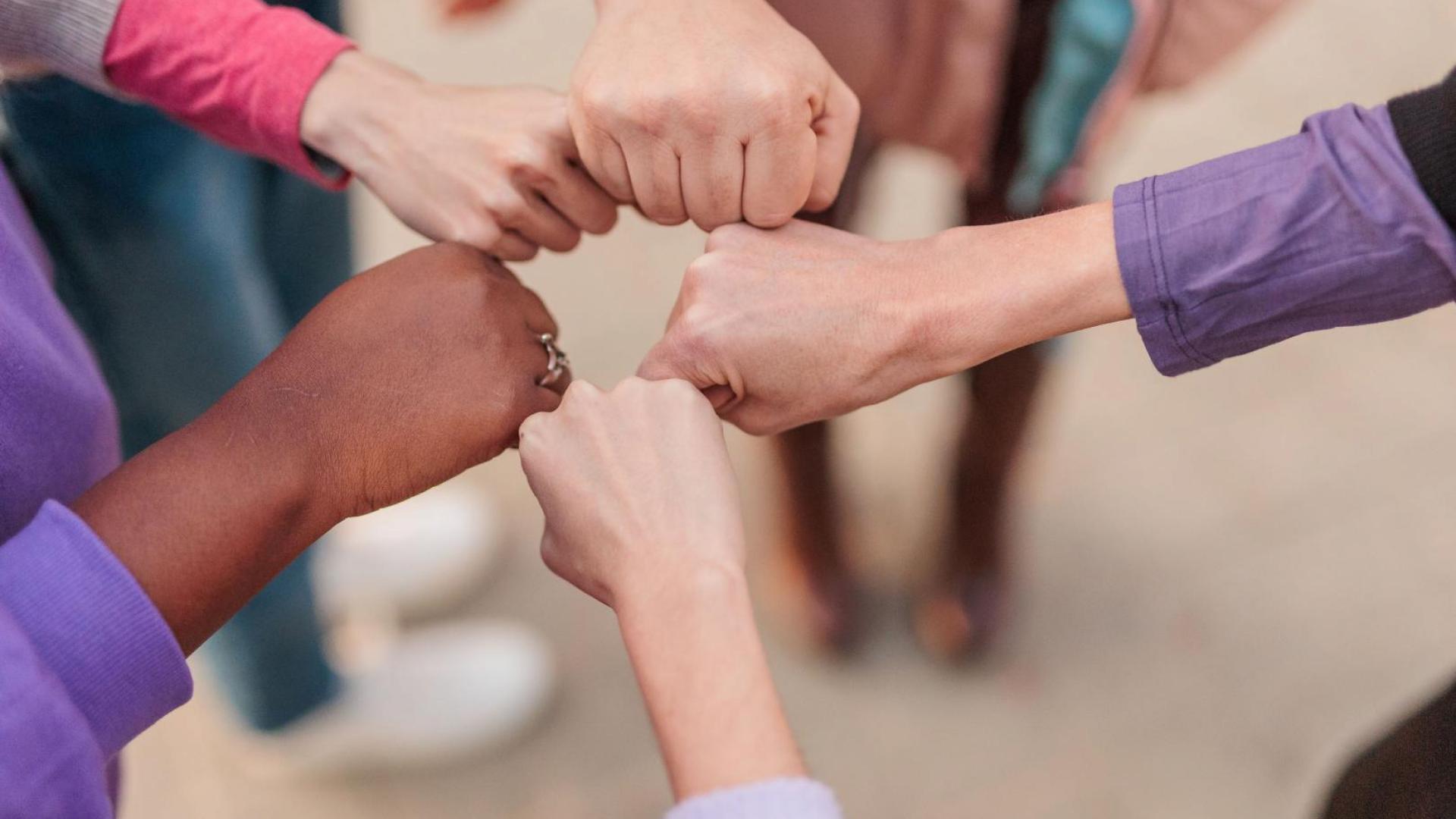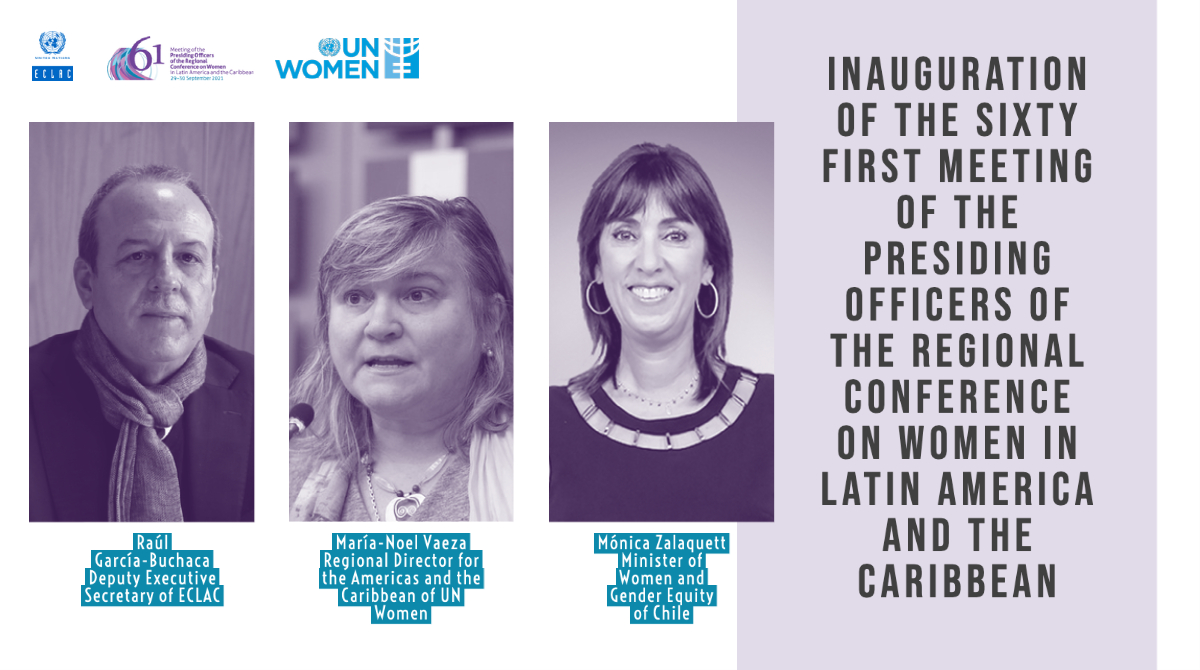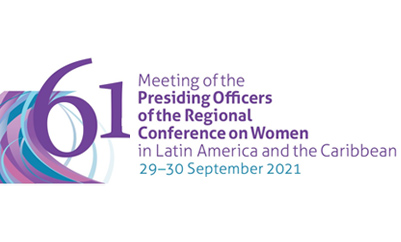The Care Society as a Horizon for Sustainable Recovery with Gender Equality Will Be the Main Theme of the 15th Regional Conference on Women, which will take place in Argentina in 2022
Work area(s)
This was one of the agreements reached at the Sixty-first Meeting of the Presiding Officers of the Regional Conference on Women in Latin America and the Caribbean, organized by ECLAC in coordination with UN Women.

“The care society: a horizon for sustainable recovery with gender equality” will be the main theme of the Fifteenth Regional Conference on Women in Latin America and the Caribbean, which will take place in Argentina during the last quarter of 2022, according to the agreements made today by the Ministers and senior authorities from mechanisms for women’s advancement who participated in a two-day virtual meeting organized by the Economic Commission for Latin America and the Caribbean (ECLAC) in coordination with the United Nations Entity for Gender Equality and the Empowerment of Women (UN Women).
At the Sixty-first Meeting of the Presiding Officers of the Regional Conference on Women in Latin America and the Caribbean, the authorities also approved a road map leading up to the next Conference, which includes subregional sessions, meetings with specialists and a broad participatory process.
>As part of the agreements reached at the gathering, the delegates committed to “advancing recovery plans with affirmative actions that foster comprehensive care systems, decent work and the full and effective participation of women in strategic sectors of the economy for a transformative recovery with gender equality aimed at the sustainability of life and for the transition to a care society.”
They also reiterated their call for COVID-19 response and recovery policies to incorporate a gender perspective and include the participation of all women and girls in their design and execution, taking into account intersectionality and the multiple forms of discrimination that exist, and they reaffirmed their commitment to taking the measures needed to accelerate the effective implementation of the Beijing Declaration and Platform for Action and of the Regional Gender Agenda.
Participating in the meeting’s closing session were Ana Güezmes García, Director of ECLAC’s Division for Gender Affairs, speaking on behalf of Alicia Bárcena, the regional organization’s Executive Secretary; María-Noel Vaeza, Regional Director for the Americas and the Caribbean of UN Women; and Mónica Zalaquett, Minister of Women’s Affairs and Gender Equity of Chile, in her capacity as Chair of the Presiding Officers of the Regional Conference on Women in Latin America and the Caribbean.
Ana Güezmes reemphasized the importance of moving towards a care society to achieve a transformative and sustainable recovery with gender equality in Latin America and the Caribbean. “Care is a public good, it is indispensable for life, it cannot be resolved solely within the family or in households. We must address it from the perspective of co-responsibility. We now have the opportunity to build that inspiring future for all women, youth, adolescents and girls. It is urgently necessary to redistribute time, resources and power to move towards a new development pattern based on gender equality and sustainability,” she declared.
ECLAC’s representative further stressed the key role that Ministries of Women’s Affairs and the mechanisms for women’s advancement play in mainstreaming the gender perspective in all the measures aimed at addressing the pandemic and in promoting affirmative actions that would enable averting, for example, a 13 year setback in women’s labor participation, such as the one existing today as a result of the COVID-19 crisis.
Meanwhile, María-Noel Vaeza emphasized that “what we are doing is unique in the world; there is no other region that has a Regional Conference on Women with sustained work for more than 40 years, advocating for gender equality. Therefore, our voices are heard much more loudly” in distinct global forums, such as the Commission on the Status of Women. The representative of UN Women sustained during the meeting that “the centrality of care is going to generate more egalitarian societies” and that comprehensive care systems will be the engine of the socioeconomic recovery in the region after the pandemic.
“We cannot miss this window of opportunity to move towards a care society from a feminist and human rights perspective. We have been able to put this issue on the agenda: the COVID crisis brought to light the absolute indispensability of care work for the sustainability of life,” Minister Mónica Zalaquett stressed in her remarks, expressing gratitude for the broad support shown for the Regional Alliance for Women’s Digitalization in Latin America and the Caribbean, led by Chile and with technical support from ECLAC and UN Women, and reiterating her call for governments to actively participate in this initiative.
Earlier, Elizabeth Gómez Alcorta, Argentina’s Minister for Women, Gender and Diversity, indicated that “I am proud that our country will be the host nation for the next Regional Conference on Women in Latin America and the Caribbean,” which she described as “a privileged forum for building commitments on gender equality and protection of the rights of women and LGTBIQ+ in our region.” Gómez Alcorta applauded the choice of the next Conference’s theme and expressed her commitment to work on building a solid agenda, with substantial commitments that can be translated into concrete public policies. “We have the historic opportunity to place care at the center of the political agenda, to create, based on our convictions, a true care society,” she underscored.
At the meeting, authorities welcomed the international statement on the importance of care in the human rights arena that was presented jointly by Argentina and Mexico and co-sponsored by 50 countries during the 48th session of the United Nations Human Rights Council.
They also commended the creation of the Global Alliance for Care Work – launched by Mexico with the support of UN Women during the Generation Equality Forum, held in Mexico City in March and in Paris in July – as a co-creative space for multiple actors to share experiences and good practices with the aim of advancing the agenda for the right to care at a global level.
Finally, the Ministers highlighted the launch of the first call by the Regional Fund in support of Women’s and Feminist Organizations and Movements, and encouraged the governments of Latin America and the Caribbean, as well as other countries, United Nations agencies, funds and programs and other relevant stakeholders, to contribute financial resources to ensure its sustainability.
Participating in the meeting were delegates from 36 of ECLAC’s Member States and associate members, 10 representatives of UN agencies, funds and programs, 6 from specialized organizations and 15 from intergovernmental entities. They were joined by 217 members of civil society, 12 members of academia and 55 participants from other sectors.
Related content

Moving Towards a Care Society in Latin America and the Caribbean is Urgent for Achieving a Transformative and Sustainable Recovery with Gender Equality
Authorities and representatives of civil society and international organizations participated in the first day of the Sixty-first Meeting of the Presiding Officers of the Regional Conference on Women…

Ministers and Senior Authorities from Mechanisms for Women’s Advancement Will Debate the Importance of Moving Towards a Care Society in Latin America and the Caribbean
On September 29-30, the Sixty-first Meeting of the Presiding Officers of the Regional Conference on Women in Latin America and the Caribbean will take place virtually, organized by ECLAC in…

Sixty-first meeting of the Presiding Officers of the Regional Conference on Women in Latin America and the Caribbean
Sixty-first meeting of the Presiding Officers of the Regional Conference on Women in Latin America and the Caribbean will be held virtually from 29 to 30 September 2021. The meeting is being…
Related link(s)
Country(ies)
- Latin America and the Caribbean
Contact
Public Information Unit
- prensa@cepal.org
- (56 2) 2210 2040
